CGC Census - A Game for the Thousandth Collector
Let’s play a game!
Imagine a game for one thousand lucky collectors to win a collection of CGC graded comics from the CGC Census universal grades. Each of these one thousand collectors holds a winning ticket numbered from #1 to #1,000. The game provides the single best available universal CGC graded copy for each collection, in the order of the winning ticket numbers.
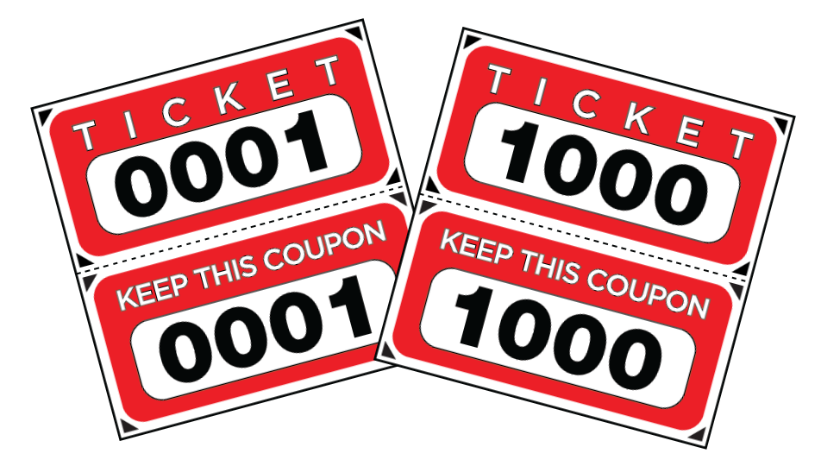
This game uses the collector concept of “earliest appearance of a character” and rewards the winning collectors from the CGC Census. For the earliest appearances of Superman, Batman, and Spider-Man, the collector holding winning ticket #1 would receive the best CGC copy of Action Comics #1, the best copy of Detective Comics #27, and the best copy of Amazing Fantasy #15. Winning ticket #2 would receive the second best CGC universal copy of those books, #3 the third best copy, etc. Much focus in comic book collecting is placed on the highest graded copies of books which can be owned by just a few dozen people. There are thousands of comic book collectors, so let’s dig a little further into the prizes.
What about the thousandth collector, holding the #1,000 winning ticket?
Starting with Spider-Man, perhaps the most popular comic book character today, one thousand winning collectors would each receive one CGC universal graded copy of Amazing Fantasy #15 (1962), the first appearance of Spider-Man. The collectors holding winning tickets #1 through #10 would receive a universal CGC 9.6 or CGC 9.4, since there are ten total copies on the CGC Census. Ticket #100 would receive a universal CGC 7.5, etc.

The CGC Census shows 2,315 universal copies have been CGC graded and there are over 1,000 copies at CGC 3.5 or higher, so the #1,000 ticket holder would be awarded a universal CGC 3.5 Amazing Fantasy #15.
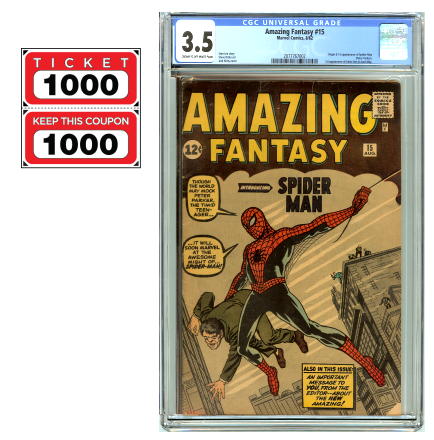
When it’s time to award copies of Spider-Man’s next appearance, ticket #1,000 would receive a universal CGC 4.5 for Amazing Spider-Man #1, the one-thousandth best copy available for Spider-man’s second appearance.
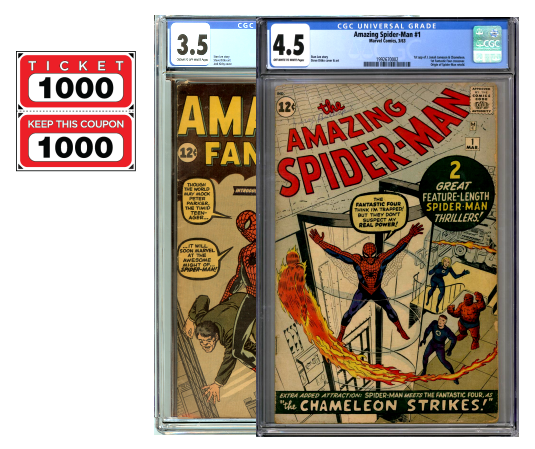
Many major characters have enough universal CGC graded copies to reward the one thousand winners with a copy of the books containing the first appearance.
For the earliest appearances of Wolverine, the CGC Census has enough copies of both Incredible Hulk #180 and #181 for the one thousand winning collectors receive one high grade copy of each book. The CGC Census currently shows 1,002 universal copies of Incredible Hulk #181 at CGC 9.4 or higher, and even the thousandth collector (ticket #1,000) wins a CGC 9.4 Incredible Hulk #181 for their collection. For the earlier brief appearance of Wolverine in Incredible Hulk #180, the CGC Census has enough copies for each collector to have universal CGC 9.0 or higher. It is not currently possible for all one thousand collectors to win both Incredible Hulk #180 and #181 in universal CGC 9.4 or higher, because issue #180 only has 523 copies which qualify. The thousandth collector wins a CGC 9.0 Incredible Hulk #180.
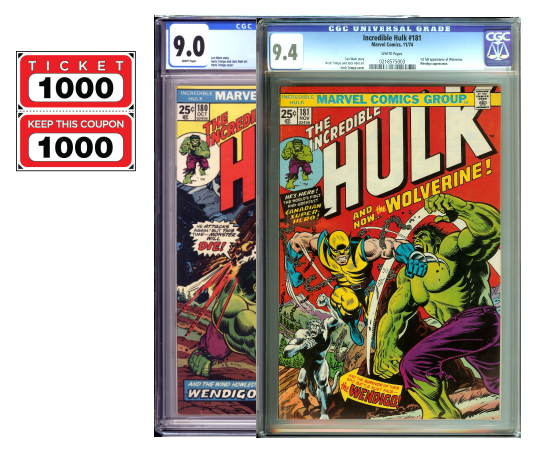
So far, winning ticket #1,000 has these prizes:
Earliest appearances of Spider-Man, Amazing Fantasy #15 – CGC 3.5, Amazing Spider-Man #1 – CGC 4.5
Earliest appearances of Wolverine, Incredible Hulk #180 – CGC 9.0, Incredible Hulk #181 – CGC 9.4
That takes care of early appearances of Spider-Man and Wolverine, but it’s time to ask the big questions, “What about Superman?” and “What about Batman?”
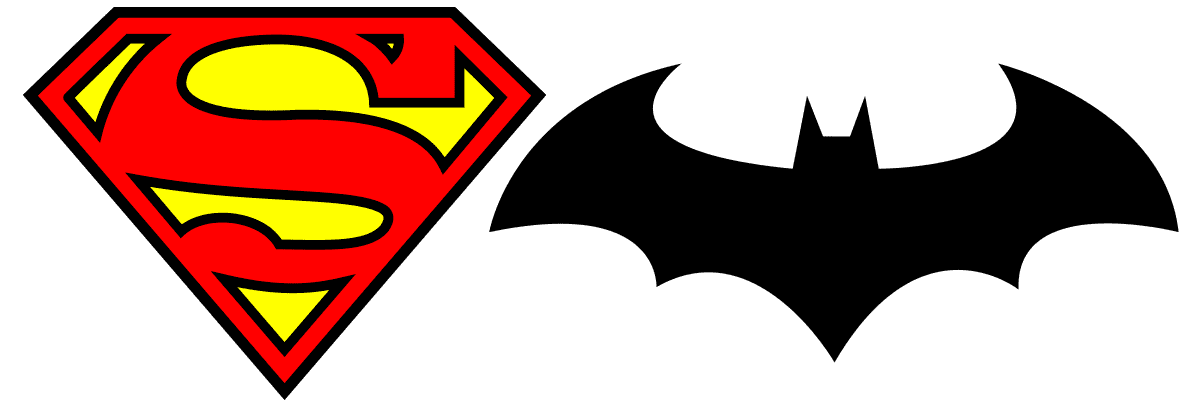
Action Comics #1 (1938) has only 43 universal CGC graded copies on the CGC Census. Winning ticket holders #1 through #43 each get a copy, but what about winning ticket #44? Since the first appearance of Superman in Action #1 is no longer available in a CGC universal grade, the game stipulates that the second earliest appearance is used. Action Comics #2 supplies a copy for winning tickets #44 through #66, but then there are no more universal CGC copies of Action Comics #2. Moving through the earliest appearances of Superman, Action Comics #3 through #6 only cover enough winning tickets up to ticket #155. Winning ticket #156 gets a surprise, since they are awarded with the highest graded copy of Action Comics #7, Superman’s seventh appearance, but the second comic with Superman on the cover. Congratulations to winning tickets #156 and #157, which both receive a universal CGC 8.0 copy of Action Comics #7. I believe winning ticket #155 will be jealous while holding a universal CGC 0.5 Action Comics #6, but that’s the game. Earlier appearances are awarded first.
At this point, the earliest appearances of Superman still available move through other copies of Action Comics #7, then #8, #9, and #10, supplying a universal CGC graded copy to winning tickets up to #244. Action Comics #11 and New York World’s Fair 1939 are both dated April 1939, supplying the earliest available Superman appearance in CGC universal graded copies to winning tickets up to #351. Action Comics #12 and #13 take care of winning tickets through #407. Winning ticket #408 might be the luckiest winner in the game, since the next earliest available appearance of Superman is now Superman #1 and the highest available universal grade is CGC 8.5, the current (May 2022) world record holder for the highest price paid for a comic book.
Additional copies of books graded by CGC will change the CGC Census for any of the earlier appearances of Superman in Action Comics #1 to #13 or New York World’s Fair 1939. In the imaginary game, CGC Census changes would change which winning ticket receives the CGC 8.5 Superman #1. By the time this article is printed, CGC 8.5 Superman #1 might go to winning ticket #409 or even #444, or some other comic might become the highest price ever paid. Depending upon when this imaginary game is played, these game results would change with the CGC Census.
The earliest Superman appearances would award all universal CGC copies of fifteen different comics from 1938 and 1939, but fewer than 500 winning tickets would be covered. Action Comics #14 through #18, and Superman #2 and #3 are awarded next in the correct date order. Finally, winning ticket #1,000 receives a universal CGC 3.5 Action Comics #19, to satisfy the best universal CGC copy of the next available “earliest appearance of Superman” in the game.
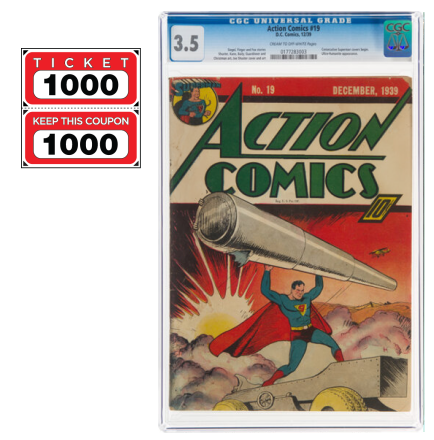
Unlike Spider-Man and Wolverine, the earliest appearances of Superman would require nearly two dozen different 1938 and 1939 comic books to award 1,000 lucky collectors with universal CGC graded copies.
The earliest Batman appearances award tickets #1 through #36 with universal CGC copies of Detective Comics #27. Winning tickets up to #494 are awarded with universal CGC copies of Detective Comics #28 through #37. Winning ticket #495 would receive a CGC 9.4 Detective Comics #38, which is a major prize, but it is winning ticket #616 which would receive CGC 9.4 Batman #1, the next earliest appearance of Batman after Detective Comics #39. The next highest copies of Batman #1, followed by Detective Comics #40 through #42 would be awarded to tickets up to #928, and winning ticket #1,000 receives a universal CGC 3.5 Batman #2 to complete the prizes for earliest appearances of Batman.
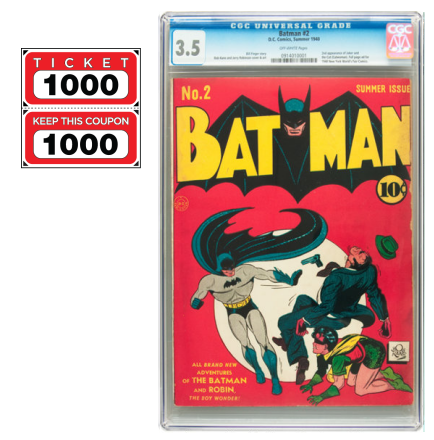
The CGC Census simply does not have enough universal counts for early Superman and Batman books to supply even one thousand collectors with two copies of early appearances from each of the first dozen comics featuring those characters. Perhaps that’s the point of this imaginary game. Collectors are all different, but the concept of “earliest appearance” for favorite characters is well established. Comic books with first appearances are usually highly prized by many more than 1,000 collectors, and the market prices for the highest available CGC grades reflect a demand that must be satisfied.
One thousand collectors are able to own universal CGC 9.8 copies of the first appearances of Venom, Carnage, Spider-man’s black costume, Spawn, Cable, Gambit, and Miles Morales, according to the current CGC Census. In fact, many thousands of collectors could own CGC 9.8 copies of those books. Many more thousands of imaginary winning tickets could be satisfied by universal CGC 9.6 or lower, without the need to move to the next earliest appearance.
Thousands of collectors can own a universal CGC graded copy of Amazing Fantasy #15 and a high grade copy of Incredible Hulk #181, but fewer than 500 collectors can own a universal CGC graded copy of any of the first fifteen issues with Superman, or the first eleven issues featuring Batman.
While no one would ever elevate a CGC 3.5 copy of Action Comics #19 or Batman #2 to a reasonable substitute for the first appearance of Superman or Batman, however, the CGC Census currently shows that if just one thousand collectors want to own universal CGC early appearances for those characters, they’ll need to look much further than Action #2 or Detective #28.
Comparing the results of the game with actual collections, how often are CGC graded books the same as a winning ticket in the top 10, or even the top 1,000 for the collector’s stated interests? Does each real-world CGC collection match well with the collector’s feelings about the characters, or are collectors spending too much time (and money) on books that wouldn’t actually be considered a prize until ticket #10,000?
Perhaps “earliest appearance” is not as desirable as “favorite artist”, “favorite title”, or “important storyline” for some collectors. The imaginary game could still be played from the CGC Census using those factors. One thousand winning tickets is not necessarily a better number for the game than five thousand or just fifty. Replaying this imaginary winning ticket game another way or not at all is fine, provided it matches collector goals.
As collectors and markets change through the years to come, some books may become bigger prizes than they are today, and some currently prized books could be considered a future winner only for tickets well beyond #1,000. Beyond the Golden Age of comics, there are more recent popular characters which do not have one thousand copies on the CGC Census for the earliest appearances. Do these characters have fewer than one thousand collectors? If so, perhaps the CGC Census is already overflowing with supply. If not, there are collectors who may never own a CGC universal copy of the first appearance of their favorite characters, some may never own even the fifth appearance. That may be alarming or not a problem, and each collector can decide.
After more than thirty years of collecting comics (and more than twenty years collecting CGC graded comics), it’s clear that not every rare comic is desired, not every plentiful comic is cheap, but some rare comics may be currently cheap, and some valuable comics may become less desired. The market is always moving. First and foremost, collect what you like, but be careful not to overpay for what you’re receiving. If cost is no concern, congratulations on holding winning ticket #1. The rest of us will need to keep playing the game from whichever ticket number we can manage.
About the Author
 |
Greg Holland has collected comic books for over 30 years and has been the administrator of the CGC Census Analysis website since 2003, currently located at CGCdata.com. He is the 1999 founder of the ValiantComics.com website and the 2004 ValiantFans.com message board. Dr. Holland holds a Ph.D. in information quality from the University of Arkansas at Little Rock and has held data science positions as research director, analyst, and administrator for government, corporations, and university. Active on the CGC Forums as ‘valiantman’ since 2002, he is also a 15+ year advisor to the Overstreet Comic Book Price Guide and contributor to later editions of the Standard Catalog of Comic Books. Greg resides in Arkansas, USA, with his wife and their daughter. |
Related news
24 Oct 2022
Canadian Price Variants (CPVs) and GPAnalysis.com Recorded Sales
With Canadian Price Variants recorded in GPAnalysis.com for decades, what can the data tell us about rarity and value when comparing against direct editions?
Read more26 May 2022
CGC Census - A Game for the Thousandth Collector
Imagine a game where 1,000 lucky comic collectors are awarded the best available copies of comic books from the CGC Census. Where would ticket #1,000 be for the earliest appearances of favorite characters? Some winning books may surprise you.
Read more